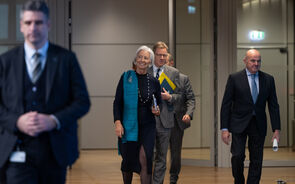Two weeks into war, the home front is getting hurt (artigo)
1 Mensagem
|Página 1 de 1
Two weeks into war, the home front is getting hurt (artigo)
Damage assessment - Two weeks into war, the home front is getting hurt
By William Spain, CBS.MarketWatch.com
Last Update: 6:30 PM ET April 4, 2003
CHICAGO (CBS.MW) -- With U.S. troops battering at the gates of Baghdad, the current phase of the war could soon be over -- but the economic damage on the home front may only be beginning.
And while the taxpayers will cover the lion's share of the costs of the invasion, American businesses and workers are already paying the price through mounting job losses, slumping travel and a parade of companies warning of lower profits.
Major companies in key sectors from technology to retail to media are warning that the war and associated geopolitical uncertainty have cut into the bottom line like a bunker buster into a Baghdad basement.
"Much of the financial suffering is being borne by investors," said Carl Tannenbaum, chief economist for LaSalle Bank in Chicago. "The uncertainty has made each day a new exercise in volatility."
According to the Department of Labor, about 465,000 jobs have vanished since the beginning of February, concentrated in turmoil-sensitive industries like lodging, leisure and airlines among the hardest hit. That's about 145,000 more lost positions than many economists wee expecting.
In the retail sector, electronics giant Circuit City (CC) said it had seen "a softening in our business, coincident with the onset of the war with Iraq," that it believes "reflects consumer preoccupation with geopolitical events."
In media, Gannett (GCI), one of the nation's largest owners of newspaper and broadcast outlets, told of advertisers that "further cancel or postpone their spending plans due to the hostilities in Iraq."
And in the long-depressed technology sector, PeopleSoft (PSFT) says "the environment for capital spending worsened in [the first quarter] with added concerns about the war and its impact on the already weakened economy."
A few days after the shooting started, hotel and resort operator Starwood (HOT) threw up its hands altogether, withdrawing previous earnings estimates and declining to give any revised ones.
'Significant deterioration'
The company said it "could not have anticipated the significant deterioration in business due to the elongated Iraq negotiations and the related geopolitical conditions that worsened over the quarter and culminated recently in armed conflict."
Moreover, Starwood decided to "suspend giving guidance until such time that it can more accurately predict the business impact of the war and the impact and timing of an economic recovery."
It's possible some companies are using the war as a scapegoat for their stumbles.
While it's hard to say any executives are hiding behind that excuse, it is evident that much of the business community remains semi-paralyzed. They're unwilling or unable to invest in new ventures until the ultimate outcome is more clear -- a state that is spreading to the consumer side as well as job losses and fear of the future rein in discretionary spending.
In wartime, the atmosphere makes "it hard for businesses to commit themselves to making long-term investments," Tannenbaum said. "No one seems willing to move forward to new projects.
While that was true going into the shooting, he added, "that mantle of conservatism has deepened as a result of the hostilities."
At the same time, the markets have been bouncing around as each kernel of good or bad news from the battlefield seems to set off wild up-and-down swings in investor confidence. The prices of commodities like gold and oil have also been subject to dramatic fluctuations.
Al Goldman, chief market strategist for AG Edwards says "it is a mistake for anybody to use the war a reason to buy or not buy a specific sector or a company" because when it ends, "the main thing is going to be the economy."
Goldman also questions the notion that the war -- even if successful in its mission to disarm Saddam Hussein -- could lead to greater problems down the road, a largely unspoken overhang.
"I don't buy the idea that the risk of terrorism is going to be increased by this war. If we do it the way I hope we do it ... I think we will see better spirits worldwide," Goldman said. "If we can bring democracy to Iraq and help economies in the Middle East, the odds improve that there will be less terrorism rather than more."
Ralph Kauffman, who tracks non-manufacturing business for the Institute for Supply Management, said that in March, nine of the 17 sectors he covers "indicated a decline in business activity in March," including agriculture, retail, and financial services.
More to come
The war, he added, "is a factor but I could not say it's the only factor or even the largest factor [but] it does seem to indicate the biggest impact will come in April rather than March."
Jittery investors, executives, and customers are only part of the problem. The invasion of Iraq has set off a wave of anti-American sentiment around the world that might well wash on to the balance sheets of U.S.-based multinationals. Well-publicized boycotts of American consumer brands have been called for, or are underway, in the Middle East and Europe with companies including McDonald's (MCD), Coca-Cola (KO), Yum Brands (YUM) and Altria's (MO) Philip Morris tobacco unit among the prime targets. None of those companies would acknowledge a fall-off in international business as of yet but they are all watching the situation closely.
At the moment, "like most boycotts, it tends to be more ink than action," said Jim Crimmins, chief strategic officer for ad agency DDB Chicago, a unit of Omnicom. "But marketers are still concerned."
For some products, "America is part of the enjoyment but in many parts of the world, that enjoyment has been diminished."
Crimmins explained that brand appeal can rest at partly on good projections of the United States -- "things like freedom, prosperity, individuality and diversity."
The war, however, has brought out in some people's minds a very different set of images that include "arrogance, paternalism and greed."
Crimmins noted how upset some people here have been with France over that long-time ally's refusal to go along with current U.S. foreign policy. With calls to avoid French goods just because of that, "I began to wonder how people would feel about France and French products if France invaded Canada to liberate Quebec."
Tannenbaum, the bank economist, warned against using the 1991 Gulf War as a benchmark for the progress and outcome of the current conflict.
"One of the errors in internal dynamics is that they have brought out the 1991 model and posted it to the board," he said. "But no two of these things are ever that similar."
Plenty of questions remain to be answered, he added. They include: "Is the Middle East going to be a safer place? Is the world going to be a safer place? And is the oil supply going to be more secure?"
In his view, it's time for people to readjust their long-term expectations. Adds Tannenbaum: "If investors or consumers or businesses think that getting to the heart of Baghdad and planting a U.S. flag there is going to take away all the risk, they are going to be disappointed."
By William Spain, CBS.MarketWatch.com
Last Update: 6:30 PM ET April 4, 2003
CHICAGO (CBS.MW) -- With U.S. troops battering at the gates of Baghdad, the current phase of the war could soon be over -- but the economic damage on the home front may only be beginning.
And while the taxpayers will cover the lion's share of the costs of the invasion, American businesses and workers are already paying the price through mounting job losses, slumping travel and a parade of companies warning of lower profits.
Major companies in key sectors from technology to retail to media are warning that the war and associated geopolitical uncertainty have cut into the bottom line like a bunker buster into a Baghdad basement.
"Much of the financial suffering is being borne by investors," said Carl Tannenbaum, chief economist for LaSalle Bank in Chicago. "The uncertainty has made each day a new exercise in volatility."
According to the Department of Labor, about 465,000 jobs have vanished since the beginning of February, concentrated in turmoil-sensitive industries like lodging, leisure and airlines among the hardest hit. That's about 145,000 more lost positions than many economists wee expecting.
In the retail sector, electronics giant Circuit City (CC) said it had seen "a softening in our business, coincident with the onset of the war with Iraq," that it believes "reflects consumer preoccupation with geopolitical events."
In media, Gannett (GCI), one of the nation's largest owners of newspaper and broadcast outlets, told of advertisers that "further cancel or postpone their spending plans due to the hostilities in Iraq."
And in the long-depressed technology sector, PeopleSoft (PSFT) says "the environment for capital spending worsened in [the first quarter] with added concerns about the war and its impact on the already weakened economy."
A few days after the shooting started, hotel and resort operator Starwood (HOT) threw up its hands altogether, withdrawing previous earnings estimates and declining to give any revised ones.
'Significant deterioration'
The company said it "could not have anticipated the significant deterioration in business due to the elongated Iraq negotiations and the related geopolitical conditions that worsened over the quarter and culminated recently in armed conflict."
Moreover, Starwood decided to "suspend giving guidance until such time that it can more accurately predict the business impact of the war and the impact and timing of an economic recovery."
It's possible some companies are using the war as a scapegoat for their stumbles.
While it's hard to say any executives are hiding behind that excuse, it is evident that much of the business community remains semi-paralyzed. They're unwilling or unable to invest in new ventures until the ultimate outcome is more clear -- a state that is spreading to the consumer side as well as job losses and fear of the future rein in discretionary spending.
In wartime, the atmosphere makes "it hard for businesses to commit themselves to making long-term investments," Tannenbaum said. "No one seems willing to move forward to new projects.
While that was true going into the shooting, he added, "that mantle of conservatism has deepened as a result of the hostilities."
At the same time, the markets have been bouncing around as each kernel of good or bad news from the battlefield seems to set off wild up-and-down swings in investor confidence. The prices of commodities like gold and oil have also been subject to dramatic fluctuations.
Al Goldman, chief market strategist for AG Edwards says "it is a mistake for anybody to use the war a reason to buy or not buy a specific sector or a company" because when it ends, "the main thing is going to be the economy."
Goldman also questions the notion that the war -- even if successful in its mission to disarm Saddam Hussein -- could lead to greater problems down the road, a largely unspoken overhang.
"I don't buy the idea that the risk of terrorism is going to be increased by this war. If we do it the way I hope we do it ... I think we will see better spirits worldwide," Goldman said. "If we can bring democracy to Iraq and help economies in the Middle East, the odds improve that there will be less terrorism rather than more."
Ralph Kauffman, who tracks non-manufacturing business for the Institute for Supply Management, said that in March, nine of the 17 sectors he covers "indicated a decline in business activity in March," including agriculture, retail, and financial services.
More to come
The war, he added, "is a factor but I could not say it's the only factor or even the largest factor [but] it does seem to indicate the biggest impact will come in April rather than March."
Jittery investors, executives, and customers are only part of the problem. The invasion of Iraq has set off a wave of anti-American sentiment around the world that might well wash on to the balance sheets of U.S.-based multinationals. Well-publicized boycotts of American consumer brands have been called for, or are underway, in the Middle East and Europe with companies including McDonald's (MCD), Coca-Cola (KO), Yum Brands (YUM) and Altria's (MO) Philip Morris tobacco unit among the prime targets. None of those companies would acknowledge a fall-off in international business as of yet but they are all watching the situation closely.
At the moment, "like most boycotts, it tends to be more ink than action," said Jim Crimmins, chief strategic officer for ad agency DDB Chicago, a unit of Omnicom. "But marketers are still concerned."
For some products, "America is part of the enjoyment but in many parts of the world, that enjoyment has been diminished."
Crimmins explained that brand appeal can rest at partly on good projections of the United States -- "things like freedom, prosperity, individuality and diversity."
The war, however, has brought out in some people's minds a very different set of images that include "arrogance, paternalism and greed."
Crimmins noted how upset some people here have been with France over that long-time ally's refusal to go along with current U.S. foreign policy. With calls to avoid French goods just because of that, "I began to wonder how people would feel about France and French products if France invaded Canada to liberate Quebec."
Tannenbaum, the bank economist, warned against using the 1991 Gulf War as a benchmark for the progress and outcome of the current conflict.
"One of the errors in internal dynamics is that they have brought out the 1991 model and posted it to the board," he said. "But no two of these things are ever that similar."
Plenty of questions remain to be answered, he added. They include: "Is the Middle East going to be a safer place? Is the world going to be a safer place? And is the oil supply going to be more secure?"
In his view, it's time for people to readjust their long-term expectations. Adds Tannenbaum: "If investors or consumers or businesses think that getting to the heart of Baghdad and planting a U.S. flag there is going to take away all the risk, they are going to be disappointed."
-
Info
1 Mensagem
|Página 1 de 1
Quem está ligado:
Utilizadores a ver este Fórum: latbal, Lisboa_Casino, lsmsimoes9, navaldoc, nbms2012, nickforum, Opcard33, trilhos2006 e 197 visitantes


